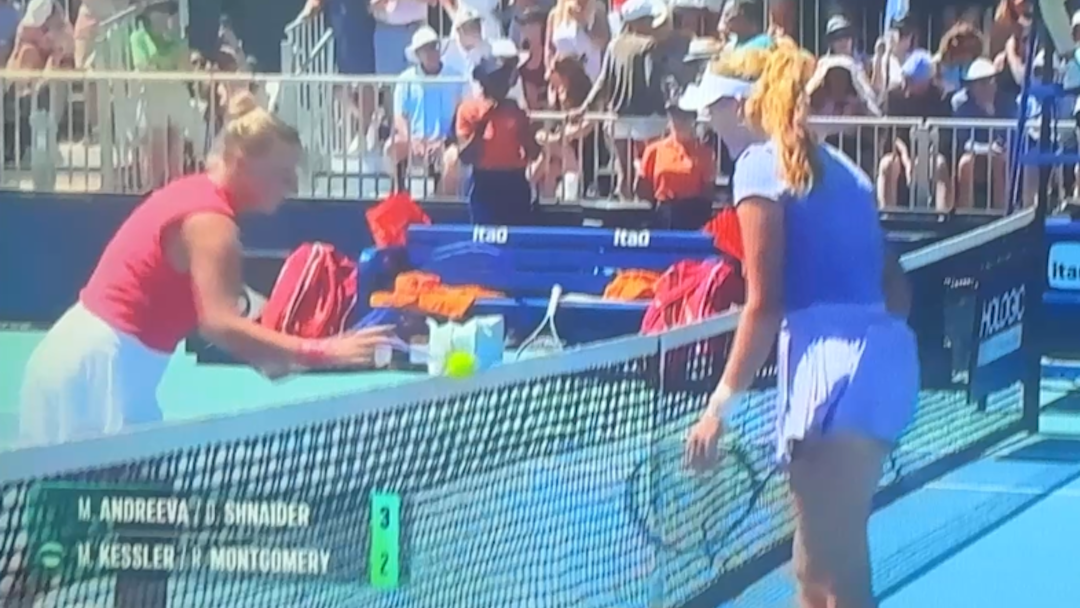For anyone who is new here, I really don’t like defaults in tennis. Whether it occurs in USTA League or tournaments, every scheduled match that isn’t played is like a broken promise. Defaults are exactly the opposite of my “More tennis is always the answer” mantra. This weekend, I am exploring the agony of defaults. This theme was prompted by an unusual number of defaults in my orbit.
Pulling back the curtain a bit, I maintain a list of future topics that have been intentionally shelved for a cooling-off period before I publish my thoughts. Sometimes, that is to obscure the identification of people, places, and times. Occasionally, it is simply because my own perspectives are too raw. Today’s post was pulled forward off the queue primarily because it didn’t feel right to plunge into defaults and not talk about this very interesting situation. I am coming at this from a rules-based perspective with an eye toward exploring potential updates to the Regulations. I sincerely hope that no one takes this personally or is offended. That is certainly not my intent.
Last month, I was en route to a weekday morning League match when I got a message from my Captain. The other team was defaulting the sole singles line, which I was slated to play. I was bummed for a couple of reasons. First, I really needed the singles match to get ready for an upcoming National tournament. Additionally, I had made non-trivial schedule gyrations to play the match as scheduled. I couldn’t seamlessly go back to my normal day. It was annoying.
I should note that I sincerely believe the other team did not know they would need to default the line until shortly before match time. Family emergencies happen. Additionally, when one player can’t make it at the last minute, it totally makes sense to default the singles line because that only impacts one other player. When a doubles line is scratched at the last minute, three players are denied the opportunity to play. The math makes sense, even though it causes singles lines to be defaulted at a much higher frequency than doubles.
Things got interesting once the remaining doubles lines converged at the site. Five minutes before the scheduled match time, the other Captain declared it to be a rainout. No lineups were ever exchanged. Opinions vary on whether the courts were playable or imminently so. That divergence in perspective ran precisely along team lines. One team wanted to play, but the other team did not.
Many factors possibly contribute to unique perceptions of playability. The strength of the players on site could have contributed to the desire to quickly pull the plug. This is a two-team League that advances directly to Sectionals. I previously wrote about two-team league challenges in “The Terrible Twos.” With the standings in a virtual deadlock, every match starts to feel like the playoffs.
However, the local league also has some unique Regulations that may have been an influence in this situation.
In matches where lineups have been exchanged but match play has NOT BEGUN, a new lineup may be exchanged for the makeup match. If a default has been issued, it is now void.
2024 GFWTC League Regulations, 12F.
By declaring a rainout, the defaulted line had been effectively voided. Interestingly enough, lineups were never exchanged since one Captain declared it to be a rainout prior to that occurring. To argue that a voided default was invalid since lineups were not exchanged would not be in alignment with the spirit and intent of this rule.
However, for additional context on expectations for a defaulted line, there is a relevant guideline that comes a little higher in this section.
Defaults: Captains should try to notify opposing captains of any defaults at least 48 hours in advance except in cases involving sudden emergencies or illness. Once an early default is issued, it can only be voided due to a rainout or extreme weather.
2024 GFWTC League Regulations, 8J.
The intent of the rule is not to punish a Captain who lets the other team know in advance that they can’t play all lines for a match that is subsequently rescheduled due to weather. We want teams to do that rather than letting the other team know immediately before the match is scheduled to begin.
There are additional rules relating to rain that provide more context.
12C. In the event of rain or wet courts, all players must be ON SITE unless both captains agree that the match is a rainout.
12D. If rain occurs just before play starts or during play and captains agree to move indoors, these matches will be treated as a rain make-up. All lines are not required to play indoors
12E. Should rain begin after match play has begun, all players must remain ON SITE for up to 30 minutes in an effort to resume match play unless BOTH captains agree otherwise. If courts are not playable, then the match will be treated as a rainout.
2024 GFWTC League Regulations, 12C, 12D, 12E.
Ours was a very unusual situation. From perusing the Regulations, I think both teams should have remained on site for at least 30 minutes before the rainout was declared. However, that did not occur. It actually does not matter if there was an exchange of lineups or not, as long as play did not start. If all the players involved with even a single line had agreed to go forward, then the default would have stood, and the lineups would have been locked in.
The combination of rules and circumstances potentially incentivizes exactly what happened. To be clear, I am not claiming that is the case, but rather that it leads to that appearance. I feel like there should be a rules-based solution to this, but it’s wickedly complicated.
The recommendation that encourages Captains to notify the other team well in advance of defaulting a line is fundamentally sound. Voiding defaulted matches that turn into rainouts is also a great idea. Otherwise, Captains get into a game of chicken with the weather, which potentially wastes the other team’s time. I have a low tolerance for people who waste my time.
Consequently, I believe a provision for voiding a defaulted line from a match that was legitimately rained out is a good and necessary rule. At the same time, it creates a potential situation where one team refuses to play on courts that are arguably playable. I also can’t help but picture that scene from Bull Durham when Crash Davis created a rainout by turning on the sprinkler system before their game the next day.
I am considering submitting a proposal to the GFWTA to amend the rule to require at least 24-hour notice to qualify for a defaulted line to be voided in the case of inclement weather. However, that isn’t a perfect solution. Any Captain who missed that deadline would just roll the dice on the weather, which would increase the number of on-site defaults. That is arguably worse than what we have now.
I briefly considered whether punitive measures should be taken for on-site defaults but decided that would not be practical. Sometimes, players genuinely flake out and don’t show. I have also played for a Captain who wasn’t very good at notifying the right number of people that they were in the lineup each week. It isn’t clear who should be penalized in those situations.
Ultimately, the defaulted singles line from that match was voided and played. In fact, the rescheduled match was the last one to occur in the season. Advancement to Sectionals hinged on the result of that one final match. It doesn’t get more dramatic than that. As it turns out, the winning team was precisely the same as it would have been had the original default stood. In this case, it really did not matter, but it could have.
It is unfortunate that rules put in place to encourage USTA League Captains to be courteous can potentially be abused for a competitive advantage. Fortunately, this spring excepted, it really doesn’t rain that much in Texas.
- 2024 GFWTC League Regulations, Greater Fort Worth Tennis Coalition, Revised 11/2023.



